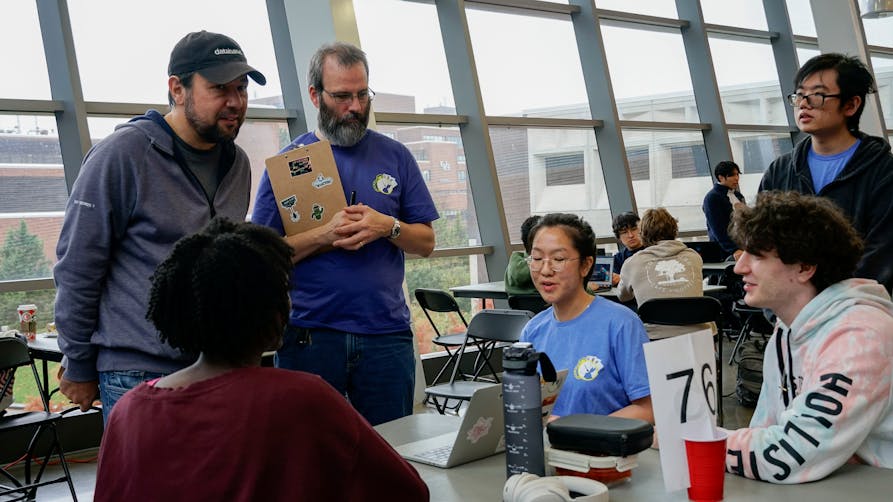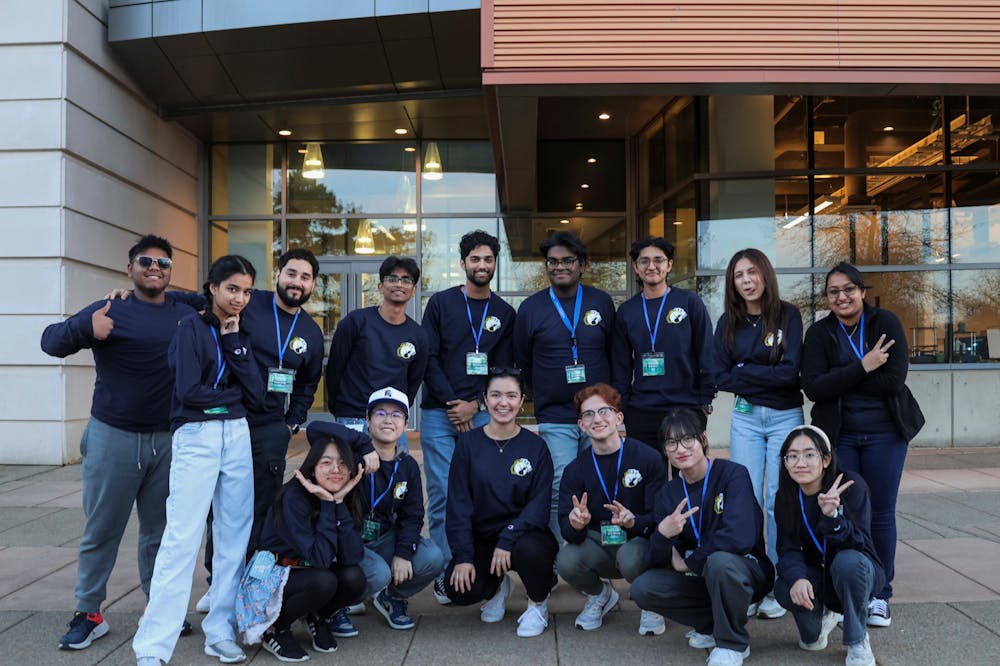A student-run Hackathon organized by UBHacking took place in Davis Hall over the weekend of Nov. 9-10, featuring team-led projects, mentorship, networking events and a career fair with sponsors Valmar Holdings and M&T Tech. The event aimed to showcase students’ hacking and coding skills. Amazon Web Services (AWS) also sponsored the event but only had representation present.
One of the leads working at UBHacking is a software engineer for AWS, currently located in Seattle. AWS said that next year they will “share some of their openings” allowing UB students to have opportunities at Amazon.“The school doesn't matter,” an AWS representative said when asked why they chose this UB event to sponsor. “We try to be as agnostic as possible, we don't really care what college you come from, more so what your experiences are [and if you] can quantify those.”

The event was sponsored by numerous organizations, and businesses – including gold, silver, and bronze ranking for their support. In the gold tier was the UB Department of Computer Science and Engineering (CSE) and Valmar Holdings. In the silver tier was M&T Tech, and AWS. In the bronze tier was Sift, Northtown Automotive Companies, and Advance2000.
UBHacking is a part of the MLH (Major League Hacking), a larger organization that does Hackathons all over the world. During the weekend of Nov. 8 to Nov. 10, 13 other hackathons from Delhi to Princeton, New Jersey were hosted.
The 32-hour hackathon hosted events ranging from tech panels to resume roasts – there even was a remake of the popular show Hot Ones, with two UB professors.
The events hosted secondary knowledge among new skills, but the main attraction to the event was the hacking itself. Students were tasked with forming teams and producing a project in any genre of field involving coding. The projects were then judged based on effort, functionality, usefulness to the target audience, technical challenge, freshness, and the pitch.
The winning prizes were $1,500 for first place, $1,000 for second place, and $500 for third place, among another prize for “tech 4 social good” at $250 where it was “dedicated for a project that is focused on the overall betterment of society.” The event also featured prizes for Best Artificial Intelligence / Machine Learning Hack, Best Usability UI/UX Hack, Best Hardware Hack, Best Crypto Hack, Spirit of the Hackathon, Best Freshman Hack, and Failure to Launch.
The event was fully packed, with David Doermann, department chair of UB CSE, saying there were “more people than seen in the past.”
(UBHacking) Winning teams:
1st - Type Int ($1,500)
2nd - UB Wondermap ($1,000)
3rd Place - Spell in Wonderland ($500)
Tech for Social Good - Instant Health ($250)
Best Freshman - Chatroom
Failure to Launch - Crafting Currents
Spirit of the Hackathon - Terminal Type Racer
Best Hardware - Garden of Amnesia
Best AI/ML - Mind Vault
Best Ux/UI - Next Up
Best Crypto - UBET
(MLH) Winning teams:
Best Domain Name From GoDaddy Registry - Sensai
Best Use if Autho - Mindbox.study
Best Use of Stream lit - Draw it right
Best Use of Terraform - Lighten

Student Projects
Clayton Freedman, an undecided freshman, was a first-time attendee of the Hackathon, having brought an additional monitor, server and desktop to support his other two teammates. Their idea was to create a file transfer website with a login page, allowing the user to “send a file to the server using their phone, then pull out their laptop across the world and access it. The web app might also have a notes section among a calendar section.” The group were all relatively new to code, and not looking to win - but they saw this as a learning experience to harness their skills, to know if coding was right for them.
Sophomores in computer science Laibah Ahmed and Tahmina Fayez and Jewel Rebello, a junior in computer science, developed a “nutrition tracker” named UBITE. “I usually scan the QR code on my food to track what I'm eating. My calories and my macros, but I realize that it's tedious, and for all the other people who want to do that too, there's no simple way to do it all in one place,” Ahmed said. “I was thinking that you could make a web app or a website where you can kind of do that all at once.”
Following this notion, Ahmed formed a team with Fayez and Rebello, with Ahmed developing the back end and Fayez and Rebello developing the front end. After attending their demo, their app was able to tell the nutrition in macros for on-campus restaurant Champa Sushi, while other establishments on campus are a work in progress - which will be finished in the coming weeks.
October Reese, a freshman in computer science, and his team decided to build a chat room, hosting it on AWS to allow for “scalability.” The team wanted to use Java because of their familiarity with the language. Reece had already done this type of project “several times in many different languages” including “C++ by GTKMM, Java with swing and the eclipse SWT.”
Junior computer science major Kendall Bullen and their team decided that they wanted to use the Spotify API (application programming interface) to create a “social media website where you can connect with people through suggestions based on the type of music you listen to, the genre, and the artist.”
More information can be found at UBHacking and MLH.
Editor's note: This article has been updated to include a more accurate number of attendees of the Hackathon, the roles of the sponsors of this event, and the subhead for a more accurate representation of the event. The Spectrum apologizes for this error.
The features desk can be reached at features@ubspectrum.com





